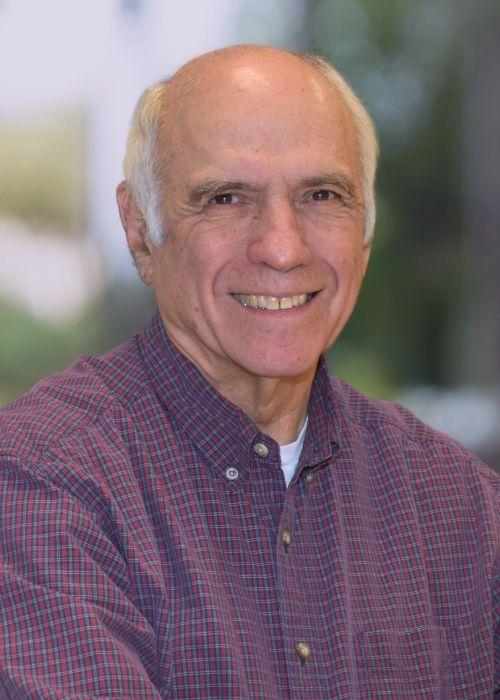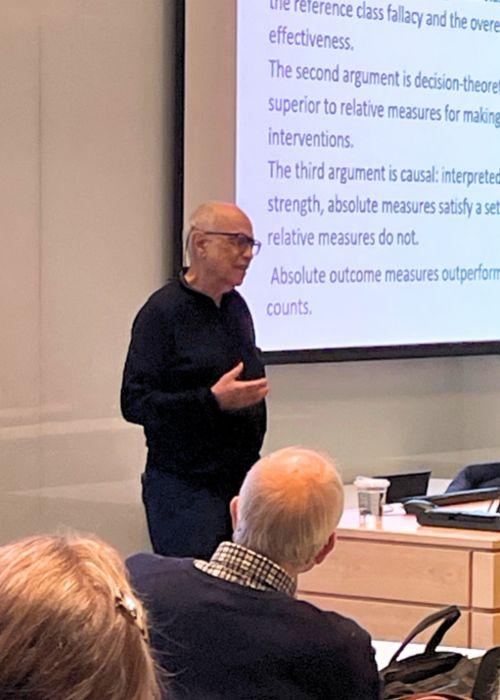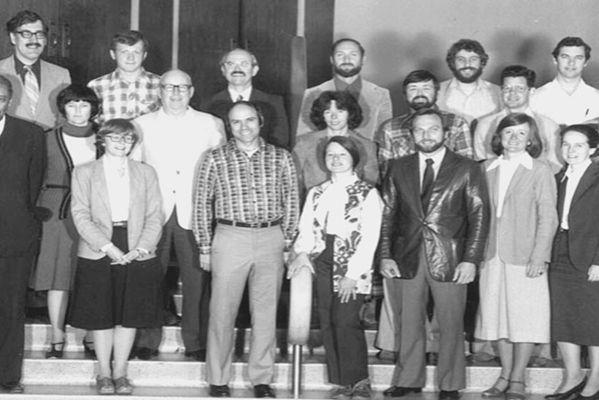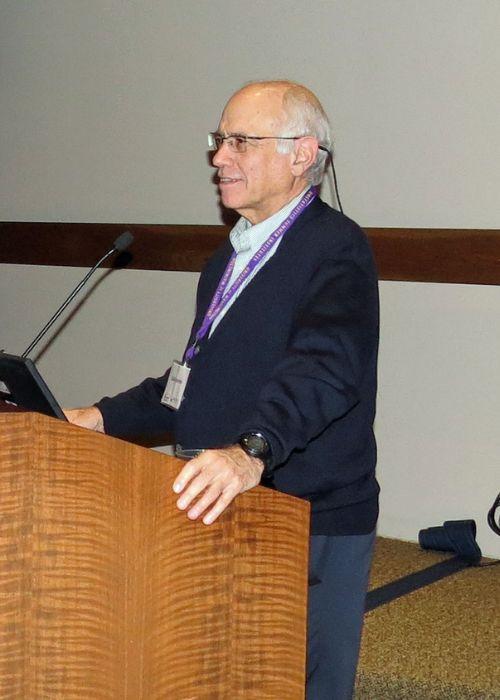After 58 years at the University of Washington, Dick Kronmal, co-director of the Collaborative Health Studies Coordinating Center (CHSCC), professor of biostatistics and statistics, and a founding member of the Department of Biostatistics, retired on June 1.

“Dick Kronmal played an integral role in the creation of our leading graduate program in biostatistics at UW by inspiring high scientific standards and a remarkably positive culture of collaboration. His expertise is extraordinary in scientific areas of design, conduct and analysis of clinical trials, and he has engaged and enlightened so many faculty, students and staff through his leadership, including in the Collaborative Health Studies Coordinating Center,” said longtime UW faculty member and former Biostatistics chair Thomas Fleming.
Colleagues honored Kronmal at a special seminar and luncheon on June 9. Those in attendance included his first PhD student Pat Wahl (PhD ’71), who went on to become Dean of the UW School of Public Health from 1999 to 2010, and his last PhD student, Robyn McClelland (PhD ’00) who is now co-director of the CHSCC and a research professor of biostatistics.
Wahl was a programmer at the UW computer center when Kronmal recruited her to the new biostatistics program.
“Dick doesn’t get enough attention for his gifted teaching,” said Wahl, noting that Kronmal’s successful fight to include research assistants in data coordinating center contracts not only provided valuable learning opportunities for graduate students but represented a new model for funding requests for statistical collaboration.

McClelland has worked with Kronmal for more than 25 years.
“Dick’s limitless scientific curiosity — his enthusiasm about everything, his interest in learning new things and in pursuing new opportunities, his collaborative mindset — has created a joie de vivre culture at CHSCC where everyone is excited about research,” said McClelland.
“Dick doesn’t do what he does for Dick’s benefit. Dick does what he does because he cares about what’s right. And he cares about influencing others to do what’s right and to do what’s right for other people. And that has allowed those of us following him to make a difference,” said Fleming.
Looking back, it’s surprising Kronmal made it to UW at all. He wanted to be a medical doctor, but a squeamishness around blood sidelined that plan. His aptitude for computing led to a job offer from the Ford Motor Company.
Lucky for UW, the day before he planned to accept the position he was offered a biostatistics fellowship with the UCLA Department of Biostatistics, which later led to a position with UW Medicine’s Department of Preventative Medicine.
Then there was the astronaut thing.
While walking down the hallway in the School of Medicine, Kronmal, a lifelong science fiction fan, noticed a poster inviting PhDs in science to apply to be an astronaut. Kronmal applied but didn’t make the final cut. “They ended up hiring someone who could fly jet planes and had a PhD,” he said.
UW first offered degrees in biostatistics in 1966 through an interdisciplinary program called the Biomathematics Group, which was housed in the Graduate School.
“I was chair of the biomathematics group for 13 years and graduate program advisor in biostatistics for 14 years, where I did a lot to help the formation of the graduate program in biostatistics, laying the foundation for it to become one of the leading Biostatistics programs in the U.S.,” said Kronmal.

Kronmal played a central role in introducing computing to UW health sciences.
“We always had the best, fastest, and most modern computing tools,” said Wahl.
“We had the first mini-computer in the whole of health sciences. We were the first to have distributed data entry for our studies where there were terminals at our clinical sites where researchers would enter data and transmit it to us. We were really at the cutting edge of computing and innovated a good deal,” said Kronmal.
Eventually, the biomathematics group disbanded into separate degree programs and Kronmal’s focus shifted to data coordinating activities, endeavors that, in time, led to the establishment of CHSCC.
Among his early achievements, Kronmal cites his role as co-investigator for a study that focused on the prevention of stroke.

“They wanted to do a clinical trial in people who had atrial fibrillation, which is a common cardiac arrhythmia that increases the risk of stroke dramatically. At the time it was not clear what appropriate treatment was so a large clinical trial was done testing aspirin versus a blood thinner called warfarin versus placebo. The results showed a dramatic decrease in risk in those who were taking both Warfarin and a modest benefit for those taking aspirin. This treatment and subsequent anti-coagulants are now the standard treatment worldwide for the prevention of strokes in patients with atrial fibrillation,” said Kronmal.
Then Kronmal became co-primary investigator of the coordinating center for the Coronary Artery Surgery Study, which compared bypass surgery to medical therapy.
“It’s a landmark study because it was rare for studies to compare a medical therapy to a surgical therapy,” said Kronmal.
“The study was able to show that there wasn’t any real difference between bypass surgery and medical therapy in terms of survival. This had a major effect on medical practice in the United States where, up until that time, everybody got bypass surgery if they had the right set of symptoms.”
As the project neared completion, Kronmal’s group was awarded a contract to be the coordinating center for a large study of cardiovascular disease in the elderly called the Cardiovascular Health Study (CHS).
One of the study’s major findings was that there were two forms of heart failure, each with a different underlying etiology, and not just one as was the understanding before the study.
At this point, CHSCC became a separate organization within SPH and its data coordinating activities continued to grow.
The center was awarded what is still one of its major projects, the Multi-Ethnic Study of Atherosclerosis (MESA), an observational study following a diverse group of more than 6,800 individuals.
“Funny thing is I never wanted to grow [the CHSCC]. What basically happened is that people who learned of us through CHS or MESA kept asking us to do the same for their projects. I basically took the attitude that we only wanted to do things that we thought were important and used our biostatistics expertise. We wanted to be co-investigators for all practical purposes,” said Kronmal.
About five years ago, Kronmal decided to focus only on short-term projects.
“I thought I should do only the projects I really enjoy and could see through to completion, so I cut back my involvement in studies that would take years to complete and focused on a few short-term studies,” said Kronmal.
“I don’t think of it as retiring. It’s just that I’ve shifted my efforts to fewer things. I’ve always believed you want to learn your whole life; you never want to stop learning. That’s the way I proceeded in life. I accomplished what I wanted to and I’m doing what I want to do.”